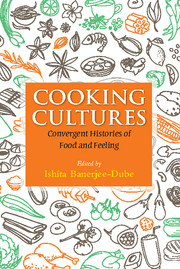Book contents
- Frontmatter
- Contents
- Acknowledgements
- Introduction: Culinary Cultures and Convergent Histories
- Part I Food, Pride, Power
- Part II Cooking, Cuisine, Gender
- Part III Food, Identity, Personhood
- 7 Local Foods and Meanings in Contemporary China: The Case of Southwest Hubei
- 8 From the Market to the Kitchen and Table: Food and its Many Meanings in Dakar
- 9 What is Human?: Anthropomorphic Anthropophagy in Northwest Mozambique
- Part IV Food, Myth, Nostalgia
- Contributors
- Index
- References
8 - From the Market to the Kitchen and Table: Food and its Many Meanings in Dakar
from Part III - Food, Identity, Personhood
Published online by Cambridge University Press: 05 July 2016
- Frontmatter
- Contents
- Acknowledgements
- Introduction: Culinary Cultures and Convergent Histories
- Part I Food, Pride, Power
- Part II Cooking, Cuisine, Gender
- Part III Food, Identity, Personhood
- 7 Local Foods and Meanings in Contemporary China: The Case of Southwest Hubei
- 8 From the Market to the Kitchen and Table: Food and its Many Meanings in Dakar
- 9 What is Human?: Anthropomorphic Anthropophagy in Northwest Mozambique
- Part IV Food, Myth, Nostalgia
- Contributors
- Index
- References
Summary
Kuyjaaykamaate doo bëré: boo cadëggee mu toj
Do not enrage the person who sells tomatoes.
Lébou proverbIntroduction
The universal act of eating is adapted by each society in accordance with its corresponding structure. This chapter attempts to explore the importance – symbolic and real – of food and eating in the everyday lives of the people of Dakar, the capital of Senegal. Its purpose is modest: to trace the intricate process that underlies eating or consuming food. A process that begins with the acquisition of the ingredients and culminates in the consumption of food at the ‘table’ following established etiquettes and norms, after the ingredients have been cooked as food. Cooking entails rituals and restrictions: rules that have significant symbolic value and underline a gendered division of labour reflected both in the space of the kitchen and in assigned roles at the ‘table’.
Taking the cue from Joan Scott, this chapter will take gender as ‘a constitutive element of social relationships based on perceived differences between the sexes’, and gender as ‘a primary way of signifying relationships of power.’ In addition, it will pay attention to Scott's valuable statement that ‘[c]hanges in the organization of social relationships always correspond to changes in representations of power, but the direction of change is not necessarily one way.’ (Scott, 1986, 1067). Focusing on the lives of ordinary, poor families of Dakar – in particular of women hawkers, vendors and sellers, and their daily act of vending goods to procure, prepare and provide food to the family – I will explore the significance of gender as embodying relationships of power, and see whether and how far changes in the organisation of social relationships have brought about change in representations of power that are not unidirectional.
My account draws upon fieldwork conducted in Dakar in the summer of 2010. I interviewed several women vendors from different markets of the capital and its suburban areas. The aim was to collect their life histories along with information on domestic economy, family structure, religion and family code. I will refer to and cite the interviews in the course of the chapter to substantiate my arguments.
- Type
- Chapter
- Information
- Cooking CulturesConvergent Histories of Food and Feeling, pp. 158 - 176Publisher: Cambridge University PressPrint publication year: 2016



